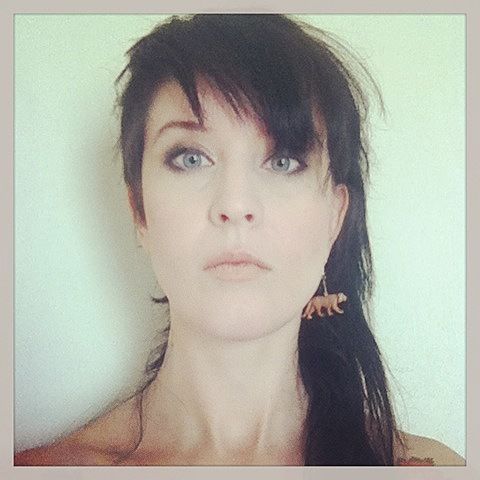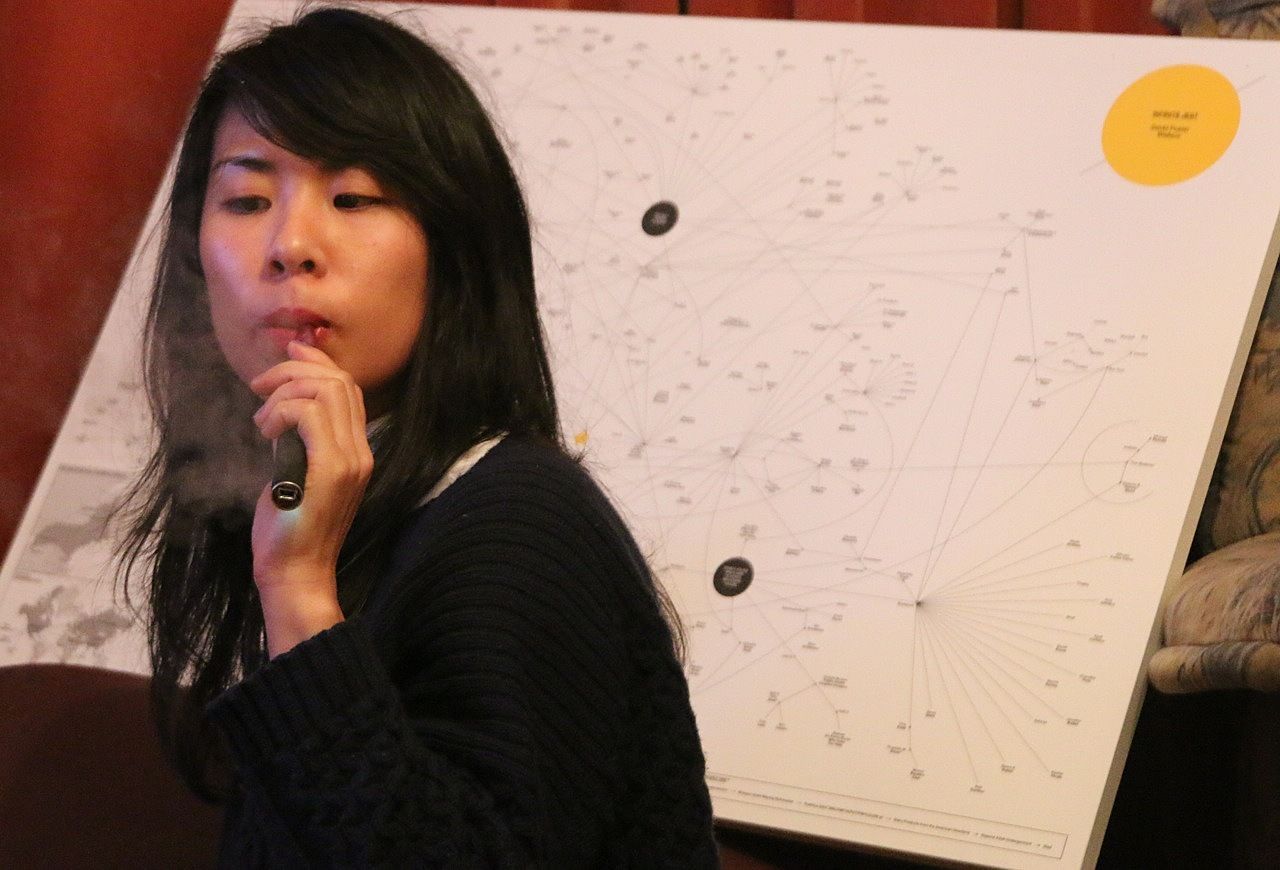Fight And Flight: An Interview with Renee-Louise Carafice
Soong Phoon hangs out with expat songwriter Renee Louise Carafice as she fights off racists outside Burger Fuel, gets real about medication and music, and plays a brave homecoming set for her new album, Power Animals.
Currently we’re faced with a pandemic of angst-ridden, lovelorn female folk/pop songstresses. But occasionally we discover some that defy the image of a limpid, girl-with-a-guitar solo act that this categorisation evokes, and former Aucklander Renee Louise Carafice is one of them. The self-taught musician now bases herself in Nashville, Tenessee, where she lives in a home, surrounded by pets of all varieties. Rabbits, birds, cats: a miniature home-zoo. While this may sound painfully self-affected; a sort of carefully-crafted twee utopia, Carafice is anything but.
She’s just ended her international tour which launched her third (and appropriately named) album, Power Animals, released on her own label. Power Animals is a record which she describes as an 'anti-suicide note' - a blunt re-statement that '(she is) alive, and (that) perhaps, being alive is more brutal than being dead.' She’s gone her own way with Bird Army Records, due to bad experiences with local labels, as well as the difficulty of getting signed considering the brutal tonality and loaded nature of some of her lyrics. On ‘A Promise, A Fireworks Display‘, she sings ‘Having you dead/Would be like having all these fields ablaze with light‘; on debut album Tells You To Fight, she whispers ‘The nurse will slip off and I’ll be gone, into the starry oblivion...They’re falling down reading the letters that tell them what happened to me’. Strangely, this seems to pan out fine for male-fronted acts like Xiu Xiu or Bright Eyes, both of whom found sustained success on major indie labels for being so visceral.
Much of the material from her first release, 2008’s Tells You To Fight, was driven by her experience of a major depressive episode. In her early twenties, she was admitted to Te Whetu Tawera, Auckland's primary psychiatric unit, and rang in her 22nd birthday there. During her better hours, she spent time crafting some of the lyrics on the record, which offered some catharsis. For a time, she suffered under the aegis of a matronly German psychiatrist (see track ‘Song For A Cruel German Psychiatrist Woman’), who terrorised her with the prospect of ECT unless she ‘picked up (her) game’ - she penned the song with the stereotypical One Flew Over the Cuckoo’s Nest images of the treatment firmly in mind.
I interviewed her shortly before her Auckland show. Animated, forthright and laconic, she intermittently dragged on her e-cigarette while we sat outside a Burger Fuel. I'd been hoping for a beer with a musician I admired this much, but I decided to settle for a vape - and attempted not to seem like a creepy fan and maintain an air of professionalism. At one point, a passerby began to harass me for being Asian, stood over us mumbling about immigrants and going back to where I came from (my mother’s womb?). Carafice assertively told him to 'fuck off!', then when he didn’t get the message, got up to push him away. 'Get the fuck outta here!'
Telling her that this kind of thing only happens on occasion here, that it's actually been years since I've encountered racially-motivated belligerence, I asked her how she knew how to deal with that type of situation so adroitly when most New Zealanders would adopt a sort of nervous silence. Carafice said – her accent touched with a faint American twang - that when she lived in Chicago ‘there were always homeless people or just random dudes coming up to me, right in my face, sometimes saying 'you're such a lovely woman' and harassing me. I'd always tell them to fuck off. Once I actually spat in someone's face. It was constant. Yet living there was also a great experience because of the nurturing, communitarian nature of musicians over there.' Despite the fragility, sometimes subtextual, sometimes overt, displayed on tracks like ‘Asylum Escape Song’, ‘Lorzopam’, or ‘A Kick to the Head’, Carafice in person is surprisingly self-assured and jocular (and equally combative when faced with my assailant).
Seeing Carafice play live at the Wine Cellar, a couple days after the interview, one wouldn't anticipate such a mode of interpersonal aggression. Clad in a white, ballerina-esque tutu and leotard and shimmering headdress, Carafice almost lookes bridal, demure on stage and exhibited a tinge of insecurity in her performance in between songs.
Even before she’s about to play something she knows, that she’s rehearsed, she’s still cautious – like she expects something – her gear, herself – to fail. 'Okay, let's try this sample out, it's going to be interesting...it's Jamie Stewart (of Xiu Xiu) hitting on his belt'. She hits a button on her synth board and glimmering noise-pop echoes out and envelops the venue. While she plays, the crowd’s captivated, despite the fact her eyes are perpetually locked down on her keyboard in sheer concentration. Earlier, someone divulged the fact that she'd lost her voice the night before, accounting for some of her apprehension.
When I spoke to her, Carafice said that she considers herself a recording artist rather than a performer, the inverse of a lot of performers who seem to thrive on audience engagement and resounding applause: 'See what I really love is recording, more than anything in the world. I record more than I play. I've been able to work with Jamie Stewart, one of my heroes, and we just hung out at his house and immersed ourselves in the production of the music. Maybe it’s because you’re in a kind of cocoon. That being said, I'm so nervous about these upcoming shows! I've only just been able to find my ideal live set-up. On Power Animals I played absolutely everything: banjo, sitar, pump organ, recorder, so it's been difficult to organise it and get the array just right.'
In Chicago, Carafice also recorded Tells You To Fight at Steve Albini’s renowned analogue studio, Electrical Audio. Asking her about the momentous experience, of getting on a first-name basis with the notoriously prickly Albini, she said she ‘crashed at Steve’s place and became really close to his cat, who would sleep in my bed every night. His next recording artist was surprised and bemused by this cat creeping into his bed’. Power Animals seems to be more of a lo-fi effort, recorded with friend Daniel Tomczak in an abandoned space which was formerly an outreach centre for mentally challenged youth. Asking about the Xiu Xiu-esque distortion on the vocals on Power Animals, Carafice said, 'they were just shittily recorded into my crap computer, but when mixing it with Danny in Detroit we decided it was perfect.’
Seeing Power Animals rendered live, one would've never guessed, about her anxiety - or the different recording process. It's rare to see an audience so rapt watching a solo act, some confident (or at least, comfortable) enough to sing along, three other vapers acting as impromptu smoke machines in the red-lit lantern room. Half of the audience was seated and the other half standing, some swaying to the soothing ambient pulse which somehow suffuses Carafice’s most searing and confrontational moments. Amidst all of this, one line rang out: 'I sound like a little bird when I'm dying'.
Carafice is forthcoming about her mental distress. When I asked about the subtext of this emotional turmoil in her music, she says, 'I suppose it's obvious that I have had some harrowing experiences, but I don't delve deeply into that, because I’m not interested in shock value. There are some things I don't want to disclose. But lyrically and musically, I let hints of pain slip in. I still flinch when I'm playing certain songs. But the response I get, is that it can be challenging music, but and then I have some fans telling me that these songs have saved their lives. I just try to say what is going on for me personally and honestly, which may be deeply macabre, but it's real.’
That being said, musically, this latest release is positively poptimistic, with synth-pop trappings and more upbeat melodies than minor-key dirges as well as being lyrically succint; a series of joyous choruses. When she started to delve into the record, perhaps five songs into her 45 minute set, the crowd began to bop, the heel-tap kicked in. Carafice’s interest in sampling has grown steadily more dextrous, and certain songs verge on a Four Tet-esque drum-and-bass beat. Taking requests, she sang 'I Have Some Problems’, the album’s advance track, which had some hands raised, fist-pumping and dancing in the back. It was possibly the best song of the set. Carafice was husky, ethereal, but still profoundly commanding, reaching most of the high notes despite having lost them the day before. In the music video, she vigorously bounces and throws punches, leaning into the camera, a feline about to pounce.
Carafice said this wave of refracted pop kicked in because at the time, she 'was listening to a lot of New Age motivational music from the eighties - which makes me laugh - but the melodies are so strange and well-produced. We even found some tones on the internet that are supposed to have subliminal effects and we thought of putting in a hair-growth tone, for fun.' If only, as the lyrics to Enya's 'Sail Away' ran through my head. More provokingly, Carafice said that one of her birds had died prior to the songwriting period. 'Not to sound like a creepy cat-lady, but I'm very attached to my pets, and this threw me into this dark downward spiral. But they finally found the right cocktail of medication that worked, and this has kept me stable for the last three years. I'd gotten to a point where I thought nothing would fix me, because I've struggled with depression and just not being able to cope since being a child, but these pills have saved my life.'
It’s a refreshing message. Many artists, writers, musicians remain averse to taking medication because they feel it affects their work, and dampens their creative output. And Carafice is honest, saying the medication really has impacted her creativity: 'it makes things less exciting, and it's hard to be interested in things, but it's worth it. I'm glad to give this all away to stay like this: stable, complete. I’ve found other ways to write and create music. When I played this latest album to a friend she thought it was my best, and commented, 'I don't mean this to sound rude, but this makes everything else you've done sound amateur and juvenile.''
And despite the supposed difficulty and lethargy that antidepressants sometimes present in terms of generating work, Carafice recorded the album within December of last year, had it mixed, produced and released by May, and is already on tour. She said that establishing Bird Army Records has been a boon, the capacity to do things at a pace that works for her. She cited bad experiences particularly with Monkey Records: Tells You to Fight was ready in 2005, and only released in 2008.
‘By that time, what I had thought sounded 'cutting-edge' just sounded like the rest of the indie artist army that prevailed on the airwaves. Having my own record label enables me to do what I want when I want.” Though she justifiably takes her work seriously when I spoke to her, Carafice is endearing and deprecatingly comic onstage. When someone yelled 'great mullet!' about her jet black hair she replied, 'if I have a really weird haircut it stops creeps from following me.' Next, apropos of nothing, but perhaps the additional weight dragging her head even closer to the keyboard: 'this hat is getting really heavy. If you like this hat it's actually for sale. Mount it on your wall?'
Reading Carafice’s previous interviews, she mentions that at one point she had to pawn her highly-prized Dobro guitar in order to subsist in Chicago. In a rude awakening about the commercial viability of being an underground musician and actually being able to survive in the States, Carafice said she makes about forty dollars a week from her album sales, supplemented by an occasional royalty cheque from local radio stations. She misses the Dobro still. 'I treasured that guitar. It was worth about three grand, but I sold it for $700.' But still, she seems genuinely satisfied when she says that she doesn't mind that she's never really taken off.
‘I was friends with Anika Moa when I was eighteen, and that was before she got really famous. But I have no desire for that. I actually thought it would be really cool to have someone else's face in my videos and on my albums. Just be an absent presence. So long as my music has some kind of effect on listeners. I work in an office job to make an actual income, then I go home and rehearse for the last few hours I can squeeze in before bedtime, which is sometimes 3 AM. My life feels complete. I'm employed, live in a beautiful house, am in a relationship and have my pets.' And cheerily, she divulged her recent discovery: 'I found a ripoff Chinese Drobo online and it sounded just as good!'.'
It was a welcome change interviewing a musician who was candid, gracious and not at all self-aggrandising - and even laughed at my jokes - but who remained dedicated to producing lyrically salient, invigorating music, despite that fact, that (let’s face it) no-one buys records anymore. Carafice even generously offered me a copy of her new album, and after asking her if she wanted to read a draft of the interview she said: ‘Don’t worry! I trust you!’ Asking her to sign my copy of Tells You to Fight, she writes: 'Thank you for believing in me - Renee', and then we part with an unsolicited, but very welcome and warm embrace.



